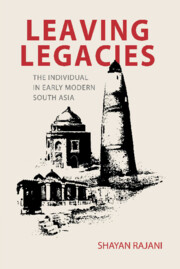3 - Books that Bind
Published online by Cambridge University Press: 28 November 2024
Summary
If individual distinction was one criterion for a mansabdar's success, the ability to command men and women was another. The family emerged as a key political institution of the Mughal Empire to meet the latter condition. It supplied martial and marital resources, both of which were essential to expanding political power. The mansabdar, especially in the higher ranks, was a military position. Unlike the modern general, the mansabdar was not given troops and officers to lead. He was expected to recruit and outfit his own men. Rank and emoluments were tied to the number of cavalry a noble was required to maintain. A robust military labor market made the task easier, but a mansabdar also required trusted officers to lead campaigns and manage his estates, or jagirs. These men were often drawn from kith and kin. A noble's command over them was not merely a function of money relation but rather of his patriarchal position as the head of the family. Even as the family served as the basis of power for noblemen, it was also a source of threat. Male relations, including sons, brothers, nephews, uncles, and others, could and did challenge patriarchal authority, sparking off violent contests of power. Affective bonds of marriage and service, the redistribution of wealth, diplomacy, and coercion were some of the tools available to contain opposition.
Marriages helped forge alliances between men of different families. They could also strengthen relationships between men within a family. Consequently, women, too, were important political resources within this patriarchal system. By the end of the sixteenth century, royal and elite women increasingly became associated with the honor of the family. Their protection and violation both came to hold symbolic significance. Concomitantly, a man giving a woman in marriage was an act of trust, and often an act of submission, connoting giving one's honor to another man. Women could facilitate bonds between men in other ways, too. Sharing a woman's milk created meaningful ties between men, who would come to regard each other as foster-brothers. Dara Shukoh attempted to secure a Rajput noble's support in his succession struggle against his brother Aurangzeb by having him drink water that had washed his wife's breast.
- Type
- Chapter
- Information
- Leaving LegaciesThe Individual in Early Modern South Asia, pp. 85 - 114Publisher: Cambridge University PressPrint publication year: 2025

